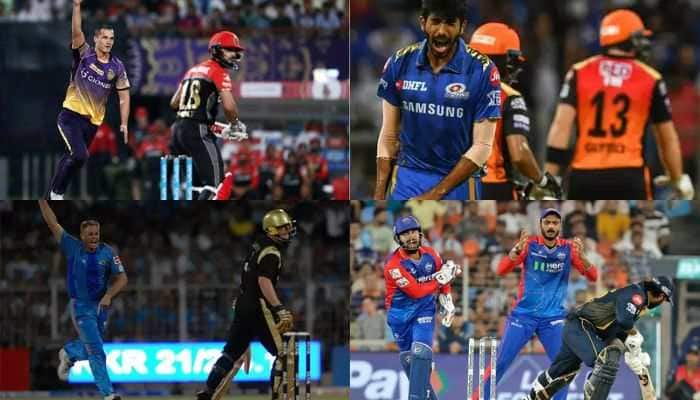Are you safe enough?
The trend of `history-sheeters` holding key govt ministries is alarming.
Trending Photos
)
 Varad Choudhary and Pankaj Sharma/ ZRG
Under tremendous pressure for inducting Raja Bhaiya as his prisons minister, the youngest ever Uttar Pradesh Chief Minister Akhilesh Yadav can take solace in the fact that several other chief ministers have, in the recent past, found virtue in handing over the reins of the sensitive law and order enforcement apparatus to politicians facing criminal charges.
An independent study by Zee Research Group (ZRG) shows the rather alarming trend of politicians facing criminal charges having assumed control of critical but varied functions involved in law and order maintenance across India.
The study reveals that five out of seven states that witnessed the formation of a new government during the last one year have ministers with criminal charges pending against them manning the law and order situation in their respective states. These states include: UP, Tamil Nadu (TN), West Bengal (WB), Jharkhand and Kerala; the exception being the two states of Punjab and Puducherry.
While Bhaiya, in-charge of the prisons ministry in UP, has 19 criminal cases against him, Moloy Ghatak, Law and Judicial Minister of WB, follows closely with 14 criminal charges. Further, the affidavit filed before the Election Commission (ECI) reveals the Minister of Law, Courts and Prison for Tamil Nadu, Thiro C.V. Shanmugam, is facing criminal charges in 10 cases.
Oommen Chandy, who is not only the Chief Minister of Kerala but also heads the Department of Criminal Justice and Vigilance, too is facing criminal charges in five cases. To complete the irony there is Arjun Munda, Chief Minister of Jharkhand, who also handles the state’s Vigilance, Law and Justice Department, with six criminal charges against him.
While none of them have been convicted yet (incidentally the line of defense propagated by Mulayam and his chief minister son), this trend has re-ignited the debate over the admissibility of people with alleged doubtful credentials into the government administrative set-up.
Former Director General of Police, Prakash Singh, says, “It is sad that politicians who have a history of crime hold key positions in the government.” In response to the question on whether or not their induction impacts governance on a day-to-day basis, he asserts, “The net result is that the police department functioning gets adversely affected with such people in powerful position in the government.”
A visibly sad Singh’s key lament is that “there is a definite visible trend that most of the ministers selected for handling law and order are not only from criminal background but are also illiterate.”
Aggrieved with the trend, former Lok Sabha Speaker and veteran Parliamentarian Somnath Chatterjee blames citizens and politicians equally for selecting “history-sheeters”. He attributes the growth of such politicians in India to “lack of conviction, overreaching power of individual politicians, as also at times due to majority mandate for a single party”. His pitch: “A mandatory enforcement of clean ministers in every Cabinet.”
Easier said than done?
National Convenor of Association of Democratic Reforms (ADR), Anil Bairwal says the way out is to ensure ticket distributions is more transparent and democratic. ADR has been at the forefront of highlighting the antecedents of candidates in the poll fray.
(With inputs from Rashi Aditi Ghosh)
Varad Choudhary and Pankaj Sharma/ ZRG
Under tremendous pressure for inducting Raja Bhaiya as his prisons minister, the youngest ever Uttar Pradesh Chief Minister Akhilesh Yadav can take solace in the fact that several other chief ministers have, in the recent past, found virtue in handing over the reins of the sensitive law and order enforcement apparatus to politicians facing criminal charges.
An independent study by Zee Research Group (ZRG) shows the rather alarming trend of politicians facing criminal charges having assumed control of critical but varied functions involved in law and order maintenance across India.
The study reveals that five out of seven states that witnessed the formation of a new government during the last one year have ministers with criminal charges pending against them manning the law and order situation in their respective states. These states include: UP, Tamil Nadu (TN), West Bengal (WB), Jharkhand and Kerala; the exception being the two states of Punjab and Puducherry.
While Bhaiya, in-charge of the prisons ministry in UP, has 19 criminal cases against him, Moloy Ghatak, Law and Judicial Minister of WB, follows closely with 14 criminal charges. Further, the affidavit filed before the Election Commission (ECI) reveals the Minister of Law, Courts and Prison for Tamil Nadu, Thiro C.V. Shanmugam, is facing criminal charges in 10 cases.
Oommen Chandy, who is not only the Chief Minister of Kerala but also heads the Department of Criminal Justice and Vigilance, too is facing criminal charges in five cases. To complete the irony there is Arjun Munda, Chief Minister of Jharkhand, who also handles the state’s Vigilance, Law and Justice Department, with six criminal charges against him.
While none of them have been convicted yet (incidentally the line of defense propagated by Mulayam and his chief minister son), this trend has re-ignited the debate over the admissibility of people with alleged doubtful credentials into the government administrative set-up.
Former Director General of Police, Prakash Singh, says, “It is sad that politicians who have a history of crime hold key positions in the government.” In response to the question on whether or not their induction impacts governance on a day-to-day basis, he asserts, “The net result is that the police department functioning gets adversely affected with such people in powerful position in the government.”
A visibly sad Singh’s key lament is that “there is a definite visible trend that most of the ministers selected for handling law and order are not only from criminal background but are also illiterate.”
Aggrieved with the trend, former Lok Sabha Speaker and veteran Parliamentarian Somnath Chatterjee blames citizens and politicians equally for selecting “history-sheeters”. He attributes the growth of such politicians in India to “lack of conviction, overreaching power of individual politicians, as also at times due to majority mandate for a single party”. His pitch: “A mandatory enforcement of clean ministers in every Cabinet.”
Easier said than done?
National Convenor of Association of Democratic Reforms (ADR), Anil Bairwal says the way out is to ensure ticket distributions is more transparent and democratic. ADR has been at the forefront of highlighting the antecedents of candidates in the poll fray.
(With inputs from Rashi Aditi Ghosh)







)
)
)
)
)
)
)
)
)
)
